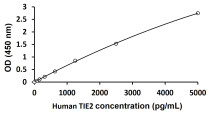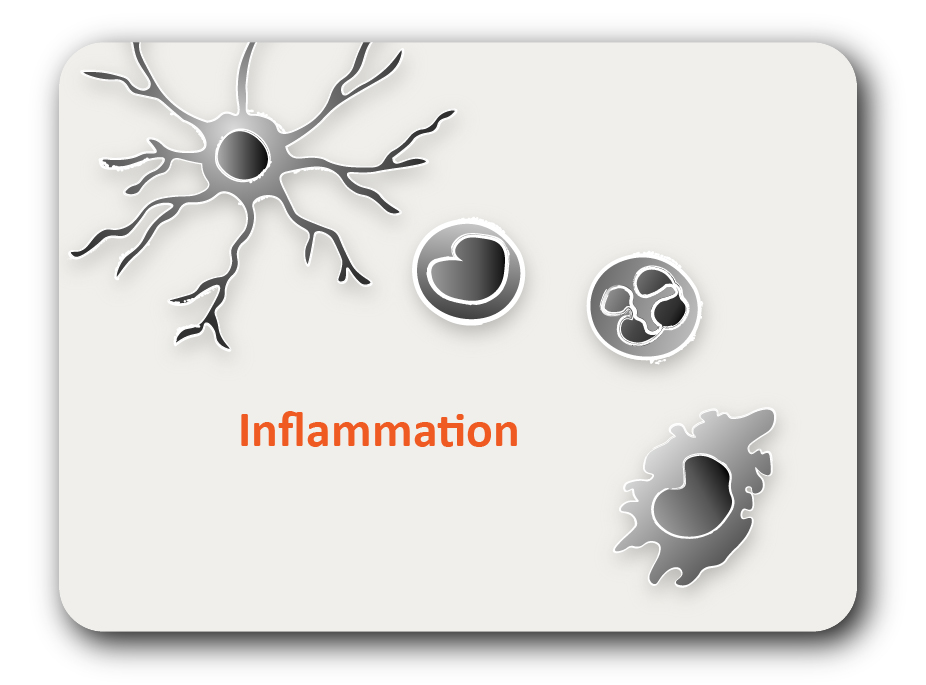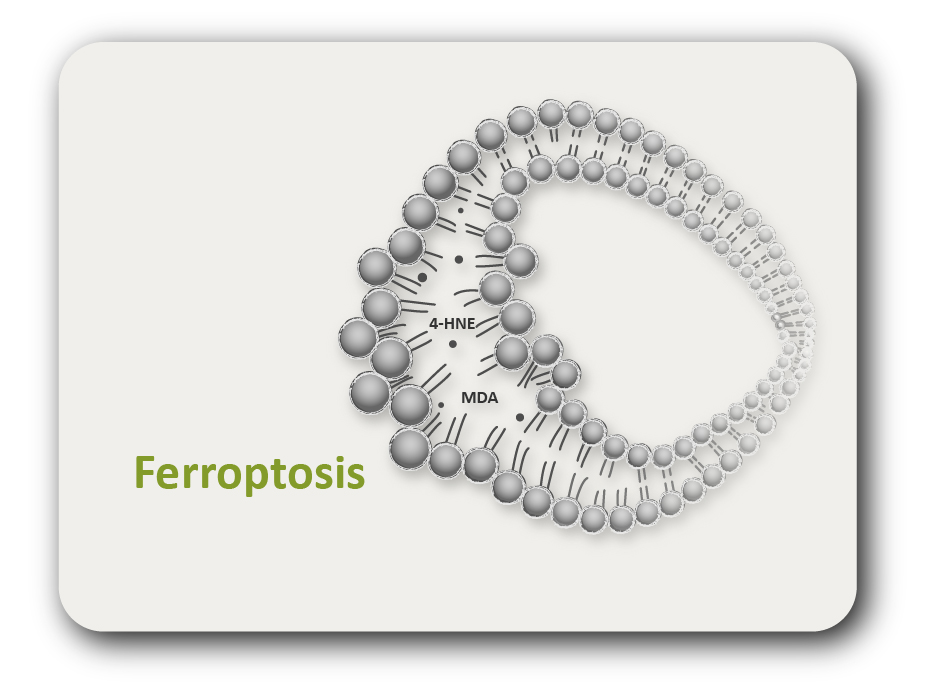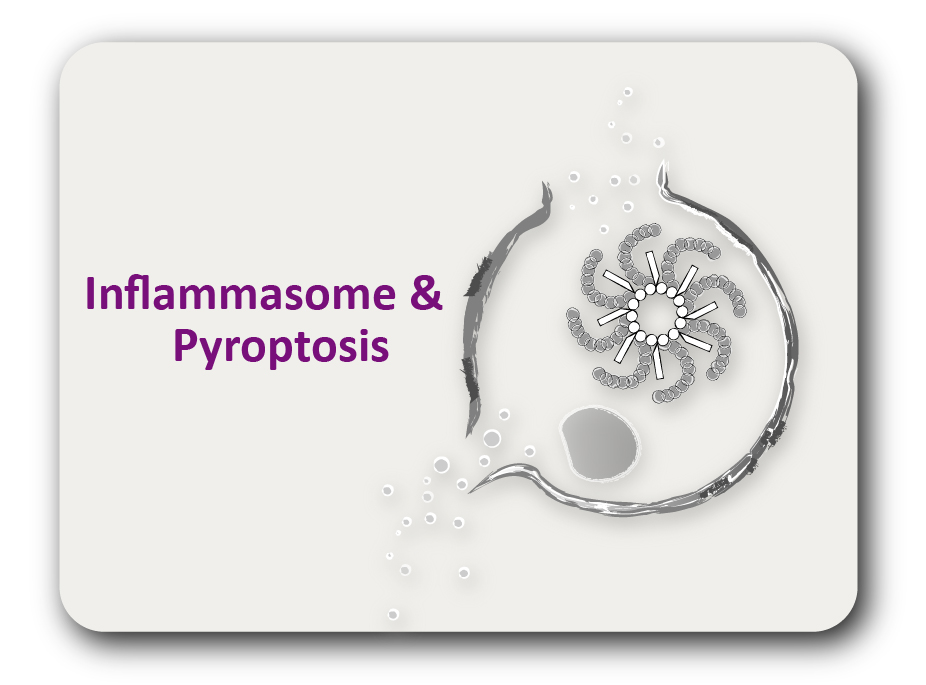ARG83031
Human TIE2 / TEK ELISA Kit
Human TIE2 / TEK ELISA 试剂盒 for ELISA and Human
概述
| 产品描述 | ARG83031 Human TIE2 / TEK ELISA Kit is an Enzyme Immunoassay kit for the quantification of Human TIE2 / TEK in serum, plasma (heparin), ascites, urine and cell culture supernatants. |
|---|---|
| 反应物种 | Hu |
| 应用 | ELISA |
| 特异性 | Not cross-reacts with: Human IL2, IL4, IL6, IL8, TIE1, Ang1, Ang2, Ang4. Mouse IL2, IL4, IL6, IL10, TIE1, TIE2. Rat IL2, IL4, IL6, IL8, TIE1, TIE2. |
| 靶点名称 | TEK |
| 偶联标记 | HRP |
| 偶联标记说明 | Substrate: TMB and read at 450 nm. |
| Protein Full name | Angiopoietin-1 receptor |
| 灵敏度 | 39.1 pg/ml |
| 样品类型 | Serum, plasma (heparin), ascites, urine and cell culture supernatants. |
| 标准范围 | 78.1 - 5000 pg/ml |
| 样本量 | 100 µl |
| 精确 | Intra-Assay CV: less than 10% Inter-Assay CV: less than 10% |
| 別名 | TEK, TEK Receptor Tyrosine Kinase, VMCM1, TIE2, Angiopoietin-1 Receptor, TIE-2, VMCM, Tyrosine Kinase With Ig And EGF Homology Domains-2, Tunica Interna Endothelial Cell Kinase, Tyrosine-Protein Kinase Receptor TIE-2, Tyrosine-Protein Kinase Receptor TEK, TEK Tyrosine Kinase, Endothelial, Endothelial Tyrosine Kinase, EC 2.7.10.1, CD202b, Venous Malformations, Multiple Cutaneous And Mucosal, CD202b Antigen, EC 2.7.10, P140 TEK, CD202B, GLC3E, HTIE2 |
应用说明
| 检测时间 | ~ 4 hours |
|---|
属性
| 形式 | 96 well |
|---|---|
| 存放说明 | Store the kit at 2-8°C. Keep microplate wells sealed in a dry bag with desiccants. Do not expose test reagents to heat, sun or strong light during storage and usage. Please refer to the product user manual for detail temperatures of the components. |
| 注意事项 | For laboratory research only, not for drug, diagnostic or other use. |
生物信息
| 数据库连接 | |
|---|---|
| 基因名称 | TEK |
| 全名 | TEK Receptor Tyrosine Kinase |
| 背景介绍 | This gene encodes a receptor that belongs to the protein tyrosine kinase Tie2 family. The encoded protein possesses a unique extracellular region that contains two immunoglobulin-like domains, three epidermal growth factor (EGF)-like domains and three fibronectin type III repeats. The ligand angiopoietin-1 binds to this receptor and mediates a signaling pathway that functions in embryonic vascular development. Mutations in this gene are associated with inherited venous malformations of the skin and mucous membranes. Alternative splicing results in multiple transcript variants. Additional alternatively spliced transcript variants of this gene have been described, but their full-length nature is not known. [provided by RefSeq, Feb 2014] |
| 生物功能 | Tyrosine-protein kinase that acts as cell-surface receptor for ANGPT1, ANGPT2 and ANGPT4 and regulates angiogenesis, endothelial cell survival, proliferation, migration, adhesion and cell spreading, reorganization of the actin cytoskeleton, but also maintenance of vascular quiescence. Has anti-inflammatory effects by preventing the leakage of pro-inflammatory plasma proteins and leukocytes from blood vessels. Required for normal angiogenesis and heart development during embryogenesis. Required for post-natal hematopoiesis. After birth, activates or inhibits angiogenesis, depending on the context. Inhibits angiogenesis and promotes vascular stability in quiescent vessels, where endothelial cells have tight contacts. In quiescent vessels, ANGPT1 oligomers recruit TEK to cell-cell contacts, forming complexes with TEK molecules from adjoining cells, and this leads to preferential activation of phosphatidylinositol 3-kinase and the AKT1 signaling cascades. In migrating endothelial cells that lack cell-cell adhesions, ANGT1 recruits TEK to contacts with the extracellular matrix, leading to the formation of focal adhesion complexes, activation of PTK2/FAK and of the downstream kinases MAPK1/ERK2 and MAPK3/ERK1, and ultimately to the stimulation of sprouting angiogenesis. ANGPT1 signaling triggers receptor dimerization and autophosphorylation at specific tyrosine residues that then serve as binding sites for scaffold proteins and effectors. Signaling is modulated by ANGPT2 that has lower affinity for TEK, can promote TEK autophosphorylation in the absence of ANGPT1, but inhibits ANGPT1-mediated signaling by competing for the same binding site. Signaling is also modulated by formation of heterodimers with TIE1, and by proteolytic processing that gives rise to a soluble TEK extracellular domain. The soluble extracellular domain modulates signaling by functioning as decoy receptor for angiopoietins. TEK phosphorylates DOK2, GRB7, GRB14, PIK3R1; SHC1 and TIE1. [UniProt] |
| 细胞定位 | Cell junction, Cell membrane, Cytoplasm, Cytoskeleton, Membrane, Secreted. [Uniprot] |
| 产品亮点 | Related products: TIE2 antibodies; TIE2 ELISA Kits; New ELISA data calculation tool: Simplify the ELISA analysis by GainData |
| 翻译后修饰 | Autophosphorylated on tyrosine residues in response to ligand binding. Autophosphorylation occurs in trans, i.e. one subunit of the dimeric receptor phosphorylates tyrosine residues on the other subunit. Autophosphorylation occurs in a sequential manner, where Tyr-992 in the kinase activation loop is phosphorylated first, followed by autophosphorylation at Tyr-1108 and at additional tyrosine residues. ANGPT1-induced phosphorylation is impaired during hypoxia, due to increased expression of ANGPT2. Phosphorylation is important for interaction with GRB14, PIK3R1 and PTPN11. Phosphorylation at Tyr-1102 is important for interaction with SHC1, GRB2 and GRB7. Phosphorylation at Tyr-1108 is important for interaction with DOK2 and for coupling to downstream signal transduction pathways in endothelial cells. Dephosphorylated by PTPRB. [UniProt] |
检测图片 (1) Click the Picture to Zoom In
| Title | Download Link |
|---|---|
| ARG83031 Human TIE2 / TEK ELISA Kit User manual |
 Download Download
|






